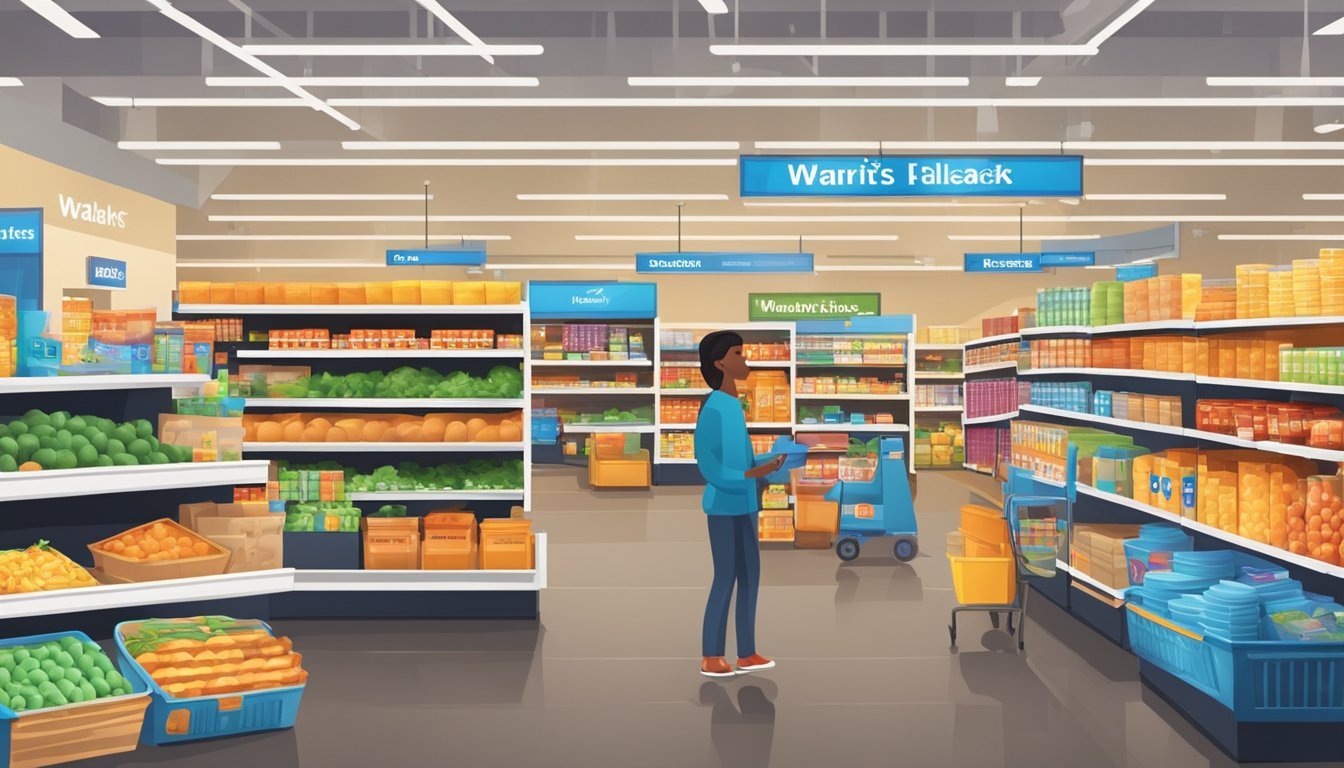Walmart vs Ralphs
Comparing Shopping Experience, Prices, and Quality
When it comes to grocery shopping, Walmart and Ralphs are two prominent names that cater to a wide base of consumers. Walmart, with its competitive pricing and expansive network of stores across the country, appeals to shoppers looking for affordability and a broad selection of goods. The company has built a reputation for offering a one-stop shopping experience, where customers can find almost everything on their list—from fresh produce to electronics—at low prices. This has allowed Walmart to secure a dominant position in the grocery industry, often being hailed as the go-to retailer for budget-conscious households.
Ralphs, on the other hand, operates primarily on the West Coast and is known for offering a localized shopping experience. While it may not boast the same extensive network as Walmart, Ralphs earns customer loyalty through its dedication to community values, quality produce, and a tailored shopping experience. Though its prices might be slightly higher compared to Walmart, Ralphs aims to attract shoppers by offering a different set of benefits, including premium products and exclusive local brands. As both retailers have their unique strengths, the choice between Walmart and Ralphs often comes down to individual shopper priorities, whether it's cost-saving, convenience, product quality, or store environment.
Company Profiles
In examining Walmart and Ralphs, a focus on their origins and current footprints reveals significant aspects of their identities as major players in the supermarket chain industry.
History of Walmart
Walmart began its journey in 1962 when Sam Walton opened the first store in Rogers, Arkansas. Walton's vision was to provide customers with low prices and great value through a discount retailing model. The company rapidly expanded across the United States, distinguishing itself as a leading supermarket chain known for its wide range of products and cost-efficiency. Today, Walmart operates thousands of stores globally and is renowned for its significant impact on the retail industry.
Overview of Ralphs
Ralphs, part of The Kroger Family of Companies, maintains a rich history as a pivotal player in the Southern California grocery sector. Founded in 1873 by George Albert Ralphs, it stands as one of the oldest supermarket chains in the region. Ralphs has built its reputation on quality, convenience, and community-centric values. Throughout its existence, Ralphs has sustained growth and now falls under the Kroger umbrella, which reported substantial revenues and operates a vast number of stores under various banners in addition to Ralphs.
Range of Products
When comparing the range of products at Walmart and Ralphs, customers will notice differences in product variety, store brands and exclusives, and specialty departments. Each store offers a unique shopping experience tailored to differing consumer needs.
Product Variety
Walmart stores are known for their expansive product variety, encompassing not only groceries but also clothing, electronics, and home goods. They carry a wide selection of national and international brands across various categories. In contrast, Ralphs, as part of the Kroger family, also offers a vast array of grocery items but with a heavier focus on food products including fresh produce, meat, bakery items, and pantry staples.
Produce: Both Walmart and Ralphs provide a variety of fresh fruits and vegetables.
Meat and Seafood: They offer a diverse selection of fresh and frozen meat and seafood.
Pantry: Shoppers can find a comprehensive range of pantry goods.
Frozen: Ample frozen food options are available, catering to convenience and variety.
Store Brands and Exclusives
Walmart promotes its store brands, which include Great Value and Sam's Choice, promising affordability without compromising on quality. These brands cover a wide spectrum of products, from pantry staples to frozen foods.
Ralphs, under the Kroger umbrella, features its own line of store brands such as Private Selection and Simple Truth, which provide a mix of everyday value items and premium specialty products.
Store Brands:
Walmart: Great Value, Sam's Choice
Ralphs/Kroger: Private Selection, Simple Truth
Specialty Departments
Walmart and Ralphs differentiate themselves with their specialty departments.
Bakery: Both stores house in-store bakeries, offering bread, cakes, and pastries.
Floral: Customers can purchase floral arrangements at either location.
Whole Foods: While Ralphs offers a selection of natural and organic options similar to Whole Foods, Walmart is expanding its offerings to compete in this area.
Seafood: Specialized seafood counters can be found in both stores, though variety and availability can vary by location.
Price Comparison
When evaluating Walmart and Ralphs for their grocery store offerings, it becomes evident that pricing strategies diverge, with Walmart often leading in everyday affordability while Ralphs provides a competitive edge through various discount and membership initiatives.
Everyday Prices
Walmart Grocery is recognized for its commitment to low everyday prices. They consistently strive to offer competitive pricing on a wide range of products. According to a CBS News report, a basket of items at Walmart amounted to $119.44, signaling the brand's position as a cost leader in the grocery sector. Ralphs, while offering a variety of products, generally positions its everyday prices slightly higher than Walmart's benchmark.
Discounts and Coupons
Ralphs frequently offers discounts and coupons to its shoppers, which can significantly reduce the total cost of groceries. Customers who take the time to seek out these offers may find that Ralphs' prices become more comparable to Walmart's low prices. Additionally, Ralphs provides personalized deals based on customer loyalty, which may result in more savings for frequent shoppers.
Membership Pricing
Membership deals are a strategic tool for both stores but in different capacities. While Ralphs doesn't have a traditional membership model, it offers a loyalty program that yields savings and benefits. Walmart, compared to wholesale clubs like Costco, does not require a membership for grocery purchases, expanding accessibility. However, Walmart+ members can obtain additional savings, like discounts on fuel, and benefits like free delivery, which might offset grocery costs for regular customers.
In terms of a broader market comparison, Walmart's pricing approach often undercuts competitors like Target, Costco, and even Amazon's Whole Foods Market. Meanwhile, specialty stores like Sprouts Farmers Market attract a different demographic that is sometimes willing to pay a premium for unique or organic offerings.
Quality of Goods
When comparing Walmart and Ralphs, consumers often consider the quality of goods each store offers. This includes the freshness and quality of produce, availability of organic and local options, and the standards for meat and seafood.
Freshness and Quality of Produce
Ralphs has a reputation for offering fresh fruits and vegetables, which are critical for a nutritious diet. They often stock a variety of seasonal and year-round items. Walmart also provides a wide range of produce, ensuring a selection that caters to different tastes and preferences.
Organic and Local Options
Both Walmart and Ralphs offer organic options, giving consumers access to pesticide-free fruits and veggies. Ralphs often sources from local farms where possible, which can support community agriculture and offer fresher options. Walmart's organic range is expansive, though the emphasis on local sourcing may vary by location.
Meat and Seafood Standards
In the meat aisle, both stores provide a selection of standard and premium cuts. Ralphs tends to prioritize quality in its meat and seafood offering, with various options that meet high quality standards. Walmart offers competitively priced meat and seafood, with an emphasis on providing affordable options without compromising on federal regulations for food safety.
Shopping Experience
When comparing Walmart and Ralphs, shoppers often notice differences in store layout, customer service, and the availability of online shopping options. Each element contributes to the overall shopping experience, impacting convenience and satisfaction.
Store Layout and Navigation
Walmart stores are known for their large, warehouse-style layout which includes a variety of departments beyond groceries such as electronics, apparel, and home goods. The wide aisles and clear signage in Walmart help customers find items quickly. They benefit from the one-stop shopping experience which saves time and effort.
Ralphs, a supermarket chain, offers a different layout that's typically more focused on grocery items. The store design is often less overwhelming and may be easier to navigate for those who are solely interested in purchasing groceries. The chain incorporates thoughtful organization, with related food items often found in proximity to one another.
Customer Service
Walmart prides itself on a self-service model, providing various customer service stations throughout the store and employees on the floor ready to help. Ralphs, on the other hand, has a reputation for a more personalized customer service approach, with employees often available to assist in the aisles and at dedicated service desks.
Online Shopping and Delivery Options
The growth of online grocery shopping has led both Walmart and Ralphs to expand their services. Walmart offers a robust online shopping platform, with options for both delivery and curbside pickup. They leverage their extensive supply chain to ensure availability and timely delivery of online orders.
Ralphs has also stepped into the online space, providing digital coupons and a user-friendly app. They offer delivery through partnerships with third-party services such as Instacart, complementing their in-store experience with the convenience of online shopping. While Ralphs may not have the same breadth as Walmart’s supply chain, they focus on quality and efficiency within their delivery services.
Consumer Perceptions
In comparing Walmart and Ralphs, consumer perceptions are shaped by their experiences with brand loyalty and customer reviews and ratings. These insights provide a window into each store's performance through the eyes of the people who shop there.
Brand Loyalty
Walmart, known for its wide reach and low prices, often attracts shoppers who prioritize budget over brand. The store's strategy to offer affordable goods, including its store brand, positions it as a go-to for cost-conscious consumers. This pricing strategy fosters a form of brand loyalty centered on value for money.
Ralphs, while enjoying a sizable presence, may not claim the same level of brand recognition as Walmart. Despite this, customers who prefer Ralphs may do so because of specific attributes or regional preferences, giving Ralphs a potentially strong, albeit more localized, base of loyal shoppers.
Customer Reviews and Ratings
Walmart:
Pros: Known for competitive prices, a wide variety of products.
Cons: Customer satisfaction may be affected by perceptions of store experience.
Based on available data, Walmart's overall score on customer review sites often reflects the advantage of low prices. However, consistent themes in customer grievances suggest that experiences within stores could impact their ratings negatively.
Ralphs:
Pros: Scores well on local preference, offers frequent promotions.
Cons: May fall behind in brand recognition compared to Walmart.
Ralphs’ ratings indicate that promotions and discounts play a significant role in customer satisfaction. However, the store’s brand recognition when pitted against national players like Walmart may affect its ratings. Customers loyal to Ralphs tend to appreciate the store's local presence and targeted deals.
Financial Considerations
When comparing Walmart and Ralphs, financial considerations play a pivotal role. Consumers typically weigh affordability and the cost-efficiency of bulk buying to determine which grocery store offers the better economic choice.
Affordability
Walmart is known for its competitive prices across a wide range of products, including groceries. Their pricing strategy often positions them as a more affordable option compared to many competitors. Walmart's strength lies in its ability to offer lower prices on both store brands and name brands. For example, a price comparison reveals that a shopper's basket at Walmart may total $119.44, while the same items might cost $126.35 at a competing store such as Ralphs.
In contrast, Ralphs, while typically not as affordable as Walmart on an item-by-item basis, does offer frequent discounts and promotions which can reduce the overall cost to the consumer. Additionally, Ralphs is competitive in its pricing of certain products, potentially offering better deals in categories like beverages or bakery items.
Cost-Efficiency of Bulk Buying
Bulk buying is a strategy used by many shoppers to save money, particularly for non-perishable items. Stores like Costco and Safeway have built a reputation around the cost savings associated with bulk purchases. While Walmart does not operate as a warehouse store like Costco, it does offer bulk buying options that can lead to significant savings, specifically on store brands and staples like veggies and other groceries.
Ralphs may not emphasize bulk buying to the same extent as warehouse stores, however, they do offer savings through their club card and promotional discounts. This can make bulk purchases more cost-effective for consumers, especially when combined with in-store promotions.
Consumers should also consider the availability of store brands, which are often cheaper than name brands. Both Walmart and Ralphs offer their own store brands, which provide a lower-cost alternative to nationally recognized brands. For instance, Walmart's Great Value products and Ralphs' private label items usually come with a lower price tag compared to similar products from companies like Whole Foods.
Community Engagement and Sustainability
When comparing Walmart and Ralphs, their approaches to community engagement and sustainability play critical roles in their operations. Both companies have made commitments to corporate social responsibility and environmental initiatives, indicating a strong awareness of their impact on society and the ecosystem.
Corporate Social Responsibility
Walmart's corporate social responsibility (CSR) is manifested through its investment in local communities and support for Walmart Academy, which helps employees advance their careers. In the fiscal year 2023, 88% of U.S. store roles above entry level at Walmart were filled internally, reflecting Walmart's commitment to employee development.
Ralphs, as a local grocery, competes with larger brands by focusing on community-driven values. It scores a 4.0 (out of 5) according to Knoji's ratings, suggesting a respectable level of dedication to CSR practices in the local grocery space.
Environmental Initiatives
Walmart has structured its environmental initiatives around four key areas. This includes enhancing sustainability in retail operations and supply chains, which respects ecological balance while maintaining product availability for consumers. 7,000 locations currently offer delivery, and over 8,100 provide pickup services, integrating sustainability with customer convenience.
Ralphs has been less public about specific environmental initiatives but, as a part of the Kroger family, it is involved in broader corporate sustainability efforts aimed at reducing waste and improving the environmental performance of its supply chain. The emphasis on sustainability denotes Ralphs' recognition of the importance of responsible environmental stewardship.
Cake Offerings and Bakery Goods
When choosing between Walmart and Ralphs, customers will find that each grocery store provides a variety of cakes and bakery goods, tailoring to different needs, whether it be a large, affordable sheet cake or a special custom order.
Sheet and Custom Cakes
Walmart is known for its cost-effective options in bakery goods. Their sheet cakes, particularly popular for their affordable pricing, are available in various flavors such as chocolate and vanilla, and can be customized with a range of designs. Walmart's sheet cakes are suitable for large events, considering their size and price point.
Ralphs, on the other hand, offers a selection of grocery store cakes that can rival homemade cakes in terms of taste. While they may not compete with places like Costco in size and price, Ralphs focuses on a variety of cake flavors and fillings, including cheesecake mousse and buttercream frosting. Customers have the option to order custom cakes which can add a personalized touch to any celebration.
Bakery Freshness Quality
In terms of bakery freshness and quality, Ralphs takes pride in offering baked goods that are prepared with a focus on freshness. Their cakes often have a more homemade taste, which is a significant consideration for customers looking for a cake that doesn't just look good but also satisfies the palate with high-quality ingredients.
Walmart's bakery section also maintains a standard of fresh baked goods, including sweet frosting that isn't overly lopsided or heavy. While taste may be subjective, both retailers have established a reputation for providing bakery products that cater to the expectations of a typical grocery store cake, aiming to balance quality and value.
Pet Care and Supplies
When it comes to pet care and supplies, Walmart is recognized for its broad selection and competitive prices, while Ralphs offers convenience with its grocery-centered model.
Pet Food Selection
Walmart boasts an extensive variety of pet food for different types of animals, ranging from dogs and cats to birds and fish. Shoppers can find a multitude of brands, both premium and budget-friendly, alongside specialized food for dietary needs. Ralphs, while having a more limited selection compared to Walmart, still provides essential pet food options for mainstream pet owners.
Walmart:
Premium Brands: Blue Buffalo, Purina ONE, Hill's Science Diet
Budget Brands: Ol' Roy, Special Kitty
Special Diet Options: Grain-free, High-protein, Limited ingredient
Ralphs:
Common Brands: Purina, Pedigree, Friskies
Special Diet Options: Organic, Natural ingredients
Accessories and Services
Walmart is more than just a retailer for pet food; it also offers a wide range of pet accessories like beds, toys, and grooming tools. Additionally, some locations provide pet services such as vaccinations and adoption events through partnerships with local organizations. Ralphs generally focuses on the essentials, prioritizing the sale of pet accessories that cater to immediate pet care needs.
Walmart Accessories:
Collars, Leashes, Wearables
Toys: Chew toys, Interactive toys, Plush toys
Beds, Crates, and Carriers
Services:
Vaccination clinics (select locations)
Adoption events (partner organizations)
Ralphs Accessories:
Basic Pet Care Items: Bowls, Leash, Collars
Limited Toys and Bedding
Final Verdict
In the competitive arena of grocery stores, Walmart and Ralphs each bring unique benefits to the table, from pricing strategies to product variety and quality.
Summary of Comparison
Walmart:
Price: Known for lower overall prices.
Variety: Offers a broad selection of goods beyond groceries.
Quality: Provides a consistent level of quality, particularly in its Great Value brand.
Ralphs:
Price: Has competitive prices, though generally higher than Walmart.
Variety: Focuses more on grocery items.
Quality: Assures high-quality products, especially organic and fresh goods.
Recommended Choice for Consumers
Budget-Conscious Shoppers:
Walmart is the recommended choice due to its price savings.
Quality-Focused Shoppers:
Consumers prioritizing organic and fresh goods might prefer Ralphs for its emphasis on quality.











